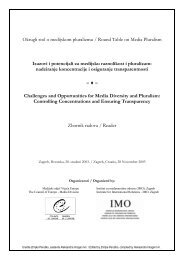almanac on security sector oversight in the Western Balkans
almanac on security sector oversight in the Western Balkans
almanac on security sector oversight in the Western Balkans
You also want an ePaper? Increase the reach of your titles
YUMPU automatically turns print PDFs into web optimized ePapers that Google loves.
Accountability of Statutory Security Actors <strong>in</strong> <strong>the</strong> <strong>Western</strong> <strong>Balkans</strong><br />
(ill)will. 201 This was a cornerst<strong>on</strong>e of <strong>the</strong>ir later transformati<strong>on</strong> <strong>in</strong>to a praetorian guard<br />
of <strong>the</strong> local Leader (Žunec, 1998; Hadžić, 2000). However, <strong>the</strong> lower down <strong>the</strong> hierarchical<br />
ladder <strong>the</strong> units were, <strong>the</strong> more operati<strong>on</strong>al aut<strong>on</strong>omy <strong>the</strong>y had. On a tactical<br />
level, <strong>the</strong> combat dynamics directly depended <strong>on</strong> <strong>the</strong> will of local warlords and <strong>the</strong>ir<br />
representatives. These units were fight<strong>in</strong>g and committ<strong>in</strong>g crimes toge<strong>the</strong>r with paramilitary<br />
formati<strong>on</strong>s. This was <strong>the</strong> root of what was later to become a large-scale and<br />
cross-border crim<strong>in</strong>alisati<strong>on</strong> of wars <strong>in</strong> <strong>the</strong> former Yugoslavia.<br />
The externally enforced end of <strong>the</strong> wars <strong>in</strong> <strong>the</strong> former Yugoslavia required <strong>the</strong> countries<br />
who participated <strong>in</strong> <strong>the</strong>m to return <strong>the</strong>ir military, police and <strong>in</strong>telligence services<br />
to peacetime c<strong>on</strong>diti<strong>on</strong>s. Demilitarisati<strong>on</strong>, demobilisati<strong>on</strong>, decrim<strong>in</strong>alisati<strong>on</strong> and<br />
depoliticisati<strong>on</strong> became top priorities <strong>on</strong> <strong>the</strong> agenda. These processes could not be<br />
carried out successfully without <strong>the</strong> return of local society from wartime to peacetime<br />
c<strong>on</strong>diti<strong>on</strong>s. Despite this, <strong>the</strong> heritage of war rema<strong>in</strong>ed an important <strong>in</strong>terven<strong>in</strong>g factor<br />
for a l<strong>on</strong>g period of time. In each country it had a different mean<strong>in</strong>g and it affected<br />
differently <strong>the</strong> scope and c<strong>on</strong>tent of reform of <strong>in</strong>herited <strong>security</strong> <strong>in</strong>stituti<strong>on</strong>s.<br />
In Bosnia and Herzegov<strong>in</strong>a, <strong>the</strong> processes were undertaken, but not f<strong>in</strong>alised, with<br />
participati<strong>on</strong> and under <strong>the</strong> auspices of NATO and various representatives of <strong>the</strong> UN,<br />
EU and <strong>the</strong> OSCE. C<strong>on</strong>versely, <strong>in</strong> Croatia and FRY, <strong>the</strong> rec<strong>on</strong>figurati<strong>on</strong> of <strong>the</strong> <strong>security</strong><br />
<strong>sector</strong> was carried out aut<strong>on</strong>omously, until <strong>the</strong> death of Franjo Tuđman <strong>in</strong> 1999 and<br />
<strong>the</strong> toppl<strong>in</strong>g of Slobodan Milošević <strong>in</strong> <strong>the</strong> 2000 electi<strong>on</strong>s. An important similarity between<br />
<strong>the</strong> two states was reflected <strong>in</strong> <strong>the</strong> fact that a caesarian <strong>in</strong>voluti<strong>on</strong> of <strong>the</strong> authoritarian<br />
regime occured <strong>in</strong> both countries after operati<strong>on</strong> “Storm“ <strong>in</strong> Croatia and<br />
<strong>the</strong> sign<strong>in</strong>g of <strong>the</strong> Dayt<strong>on</strong> Agreement. On <strong>the</strong> o<strong>the</strong>r hand, a key difference resulted<br />
from <strong>the</strong> fact that Croatia emerged as a w<strong>in</strong>ner and FRY as a loser after <strong>the</strong> war.<br />
Croatian armed and <strong>security</strong> forces ga<strong>in</strong>ed c<strong>on</strong>siderable power and reputati<strong>on</strong> dur<strong>in</strong>g<br />
<strong>the</strong> war, which gave <strong>the</strong>m priority <strong>in</strong> <strong>the</strong> distributi<strong>on</strong> of power and benefits after<br />
<strong>the</strong> war. Their c<strong>on</strong>tributi<strong>on</strong> <strong>in</strong> <strong>the</strong> war and loyalty to Tuđman spared <strong>the</strong>m from any<br />
changes, especially from radical <strong>on</strong>es. Moreover, <strong>the</strong> image of patriotic warriors and<br />
state-builders protected <strong>the</strong>m from any accountability for war crimes. C<strong>on</strong>sequently,<br />
after Tuđman’s death, <strong>the</strong> <strong>security</strong> elites and right-w<strong>in</strong>g political parties represented<br />
<strong>the</strong> biggest obstacle to radical SSR. They represented a political threat to any successor<br />
of Tuđman’s, particularly if he would dare to radically change <strong>the</strong>ir status and/or<br />
limit <strong>the</strong>ir power.<br />
On <strong>the</strong> o<strong>the</strong>r hand, Slobodan Milošević greatly profited, though temporarily, from<br />
<strong>the</strong> deafeat of his war policy. Dur<strong>in</strong>g <strong>the</strong> war, he put all exist<strong>in</strong>g state <strong>security</strong> forces<br />
under his total c<strong>on</strong>trol and authority. After <strong>the</strong> war, he secured <strong>the</strong>ir loyalty by<br />
protect<strong>in</strong>g <strong>the</strong>m from accountability for defeat, and by putt<strong>in</strong>g <strong>the</strong>ir wartime crim<strong>in</strong>al<br />
files safely under lock and key. This was <strong>the</strong> ma<strong>in</strong> reas<strong>on</strong> why <strong>security</strong> elites,<br />
toge<strong>the</strong>r with right-w<strong>in</strong>g political parties, became not <strong>on</strong>ly <strong>the</strong> ma<strong>in</strong> obstacle to<br />
201 From <strong>the</strong> military po<strong>in</strong>t of view, and <strong>in</strong> <strong>the</strong> example of <strong>the</strong> Yugoslav Nati<strong>on</strong>al Army (JNA, ARS), this is illustrated<br />
by <strong>the</strong> unjustified blockade and devastati<strong>on</strong> of Vukovar, <strong>the</strong> bomb<strong>in</strong>g of Dubrovnik, and <strong>the</strong> siege<br />
of Sarajevo that lasted several years, as well as by <strong>the</strong> later <strong>in</strong>volvement of <strong>the</strong> JNA <strong>in</strong> <strong>the</strong> war aga<strong>in</strong>st NATO.<br />
221<br />
Almanac <strong>on</strong> Security Sector Oversight <strong>in</strong> <strong>the</strong> <strong>Western</strong> <strong>Balkans</strong>



